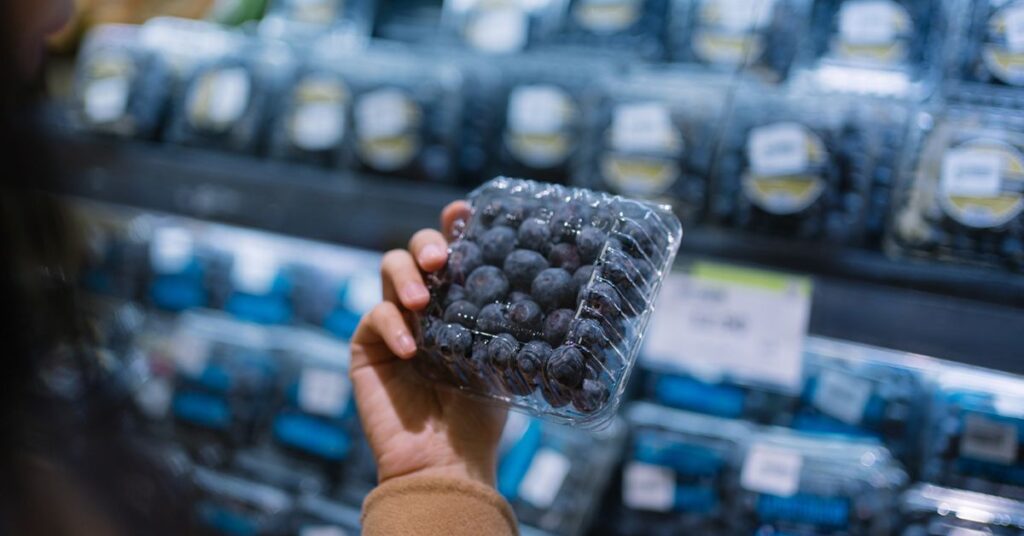- The FDA issued its highest-level risk warning for a recent recall of hundreds of boxes of organic blueberries manufactured in Georgia.
- Alma Pak International issued the voluntary recall in June after obtaining positive test results for Listeria monocytogenes in two lots of its products.
- Foodborne illness from listeria can range from mild to severe, and it’s important to seek treatment right away if you think you’ve eaten something contaminated.
The Food and Drug Administration (FDA) issued its highest-level risk warning over a recent recall of hundreds of boxes of organic blueberries due to possible listeria contamination.
Alma Pak International LLC, a Georgia-based food manufacturer, issued a voluntary recall for 400 boxes of organic blueberries weighing 30 pounds each. The boxes were primarily shipped to one customer in North Carolina.
The manufacturer initiated the recall on June 9 after receiving positive test results for Listeria monocytogenes following routine testing. The affected boxes include the Lot numbers 13325 G1060 and 13325 G1096.
On July 1, the FDA issued a Class 1 risk classification for the recall, which indicates “a situation in which there is a reasonable probability that the use of, or exposure to, a violative product will cause serious adverse health consequences or death.”
Healthline couldn’t reach Alma Pak for comment, but the company told Newsweek in a statement that “the affected product was fully recovered prior to reaching the retail market. As a result, no product was sold to consumers, and there was no risk to public health.”
“Alma Pak International has implemented additional corrective actions and preventive controls to further strengthen its already rigorous food safety systems. All products at Alma Pak undergo comprehensive testing, in addition to a strong environmental monitoring program. In response to the incident, intensified vector sampling was conducted to support the company’s proactive ‘seek and destroy’ commitment. All subsequent samples collected during this enhanced monitoring process tested negative for Listeria monocytogenes, further confirming the effectiveness of the food safety program,” the statement continued.
Foods contaminated with Listeria monocytogenes may lead to foodborne illnesses ranging from mild to severe symptoms.
- fever
- nausea and vomiting
- diarrhea
- muscle ache
When foodborne illness from listeria contamination becomes severe, it can be life-threatening. These symptoms may include:
- headaches, neck stiffness
- confusion, loss of balance
- convulsions
Severe infections are particularly dangerous for newborns, adults over age 65 and those with weakened immune systems.
If you experience flu-like symptoms or develop any of the above symptoms after eating, it’s important to contact your doctor right away. Early treatment for listeria infection can help prevent severe illness.
Despite the FDA’s recently issued high-level risk warning for blueberries, the general public need not panic.
“Blueberries are generally safe for consumption. While contamination can happen, it’s rare, and proper handling usually keeps the risk very low,” said Michelle Routhenstein, MS, a registered dietitian with Entirely Nourished, specializing in heart disease.
While the overall risk is low, Listeria monocytogenes may develop in food products during the manufacturing process.
“Listeria can grow if the berries come into contact with contaminated water, dirty equipment, or unclean surfaces during harvesting or packaging. It can also grow if the berries aren’t kept cold enough or if workers don’t follow proper hygiene practices,” Routhenstein told Healthline.
“Listeriacan also spread through cross-contamination. This occurs when ready-to-eat foods come into contact with surfaces or equipment that have been contaminated with the bacteria. For example, using the same cutting board for raw meat and then for fruit or vegetables without proper cleaning can lead to contamination and potential illness,” she said.
You can minimize your risk of listeria contamination in blueberries and other fresh fruits by washing them thoroughly under running water before preparing, cooking, or eating them.
Routhenstein suggested using a produce brush to wash any fruits with firm skins or rinds.
She noted that properly storing fruits in the refrigerator and keeping them away from raw meats and other possible sources of contamination can also help lower one’s risk.
“It’s also important to eat them within a few days and to clean your hands, kitchen surfaces, and containers before and after handling fresh produce,” she advised.
Source link : https://www.healthline.com/health-news/blueberry-recall-listeria-severe-risk-fda
Author :
Publish date : 2025-07-08 11:04:24
Copyright for syndicated content belongs to the linked Source.
